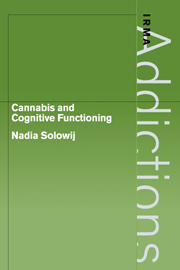Book contents
- Frontmatter
- Contents
- Series editor's preface
- Author's acknowledgements
- 1 Statement of the problem
- PART 1 A REVIEW OF THE LITERATURE
- 2 Cannabis the drug
- 3 Acute effects of cannabis on cognitive functioning
- 4 Evidence for brain damage associated with the long-term use of cannabis
- 5 Chronic effects of cannabis on cognitive functioning
- 6 Selective attention and event-related potentials (ERPs)
- PART 2 RESEARCH
- Appendix
- References
- Index
5 - Chronic effects of cannabis on cognitive functioning
from PART 1 - A REVIEW OF THE LITERATURE
Published online by Cambridge University Press: 16 September 2009
- Frontmatter
- Contents
- Series editor's preface
- Author's acknowledgements
- 1 Statement of the problem
- PART 1 A REVIEW OF THE LITERATURE
- 2 Cannabis the drug
- 3 Acute effects of cannabis on cognitive functioning
- 4 Evidence for brain damage associated with the long-term use of cannabis
- 5 Chronic effects of cannabis on cognitive functioning
- 6 Selective attention and event-related potentials (ERPs)
- PART 2 RESEARCH
- Appendix
- References
- Index
Summary
One of the well-known acute effects of cannabis is to impair cognitive processes. Therefore, it has long been suspected that cognitive dysfunction may persist well beyond the period of acute intoxication and that chronic cannabis use may cause lasting cognitive impairments. Although considerable research has been conducted into the acute cognitive effects of cannabis, there is a paucity of well-controlled studies of the long-term effects of chronic cannabis use on cognitive function. This chapter reviews the literature from each of several methodological approaches that have been used to investigate the chronic effects of cannabis on human cognitive functioning. Clinical observations will only be covered very briefly, with discussion restricted to either key papers or recent research. The priority in this chapter will be given to those human studies which made some attempts to scientifically control for extraneous variables. These have largely concentrated on neuropsychological assessments of brain function in chronic cannabis users.
The terms acute, subacute and chronic, when used to describe drug effects, have been defined in Chapter 1. Some effects may also be due to drug residues that remain in the body. Because of the slow clearance of THC and its metabolites from the body, repeated administration results in the accumulation of cannabinoids. There is no conclusive evidence for effects associated with accumulated cannabinoids, but the possibility that they continue to exert an effect remains nevertheless.
A caveat must be born in mind while critically assessing this literature; it is difficult to assess the long-term consequences of the use of any psychoactive drug. Many factors other than drug use must be controlled in order to confidently attribute any effects to the drug in question.
- Type
- Chapter
- Information
- Cannabis and Cognitive Functioning , pp. 69 - 110Publisher: Cambridge University PressPrint publication year: 1998
- 1
- Cited by



